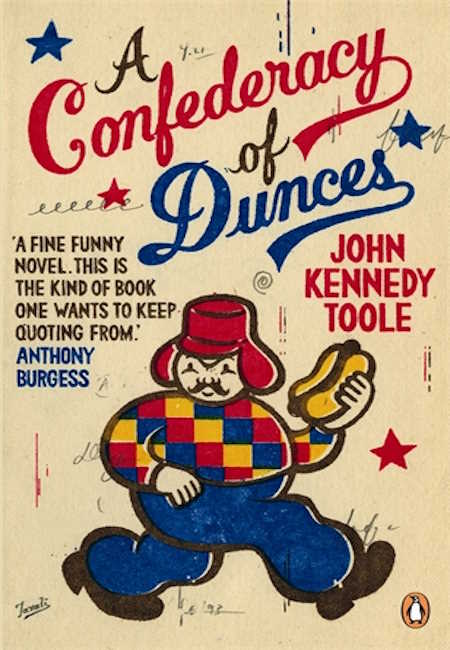A Confederacy of Dunces
Greetings, ‘A Confederacy of Dunces’ is a comedy novel by American writer John Kennedy Toole and this work is often cited as one of the best pieces of modern literature ever produced. It was released posthumously in 1980, 11 years after the troubled writer killed himself in part due to his inability to get his works published during his lifetime. Some other struggles likely contributed to his death, such as the unverified belief that he was a closeted homosexual who struggled to accept his desires. The often depreciating way he wrote his gay characters in ‘Dunces’ would certainly suggest there is some truth in the notion that he was repressing his feelings. After years of trying to get his work appreciated by the literary world, his mother Thelma was eventually successful when she gave a copy of ‘A Confederacy of Dunces’ to a novelist by the name of Walker Percy. Walker was suitably impressed by it and their combined efforts ensured the novel won a Pulitzer Prize a year after it was published. John only ever wrote one other novel called ‘The Neon Bible’ that he had completed while in his teens but he regarded it as a rather adolescent effort.
The story takes place in New Orleans during the early 1960s and is about Ignatius J Reilly, a 30 year old unemployed slob with a degree in medieval history and a great dislike of the modern world. While waiting for his mother outside a department store, Ignatius is accosted by Officer Angelo Mancuso who wants to arrest him for being a suspicious looking character. An outraged Ignatius loudly declares his innocence and begins to berate the lawman, drawing in a crowd of people watchers around them. An eccentric older man by the name of Claude comes out from the crowd to Ignatius’ aid and starts to accuse Mancuso of being a communist. This distracts the police officer who is forced to redirect his attention on to Claude, who is arrested for his behaviour. Ignatius’ mother arrives during the ruckus and uses the distraction to flee from the scene of disorder with her son. The two walk into a club called ‘The Night of Joy’ as they hope to hide from Mancuso. The bar is a shoddy strip club run by the strict proprietress Lana Lee. Using it as a place of sanctuary while Mrs Irene Reilly and her son lay low, Irene makes the most of it as an opportunity to get heavily drunk.
Meanwhile, the poorly socialized Ignatius regales a dim-witted bartender by the name of Darlene of the one time he had attempted to leave the safe confines of New Orleans. The normal routine of a Greyhound Scenicruiser bus journey had horrified and forever scarred the mollycoddled Ignatius who became even more of an isolated shut in as a result. After watching them for a bit, Lana Lee decides that both Ignatius and his mother were bringing down the atmosphere of her establishment so she kicks them out. The two decide that the heat would have died down by then and wander home but as they start out on their way, the inebriated Mrs Reilly drives her car into a building. Mrs Reilly is caught red handed and is charged a sizeable sum for the property damage she caused. Unable to pay the fine herself, she forces her lazy son to get a job so the money can be raised. He had previously coasted by without one, shunning any notion of work in favour of self-indulgently pursuing his interest in medieval philosophy. Ignatius surprisingly does gain employment with Levy Pants but soon causes problems as he, thinking of himself as a great social activist, attempts to get the African-American employees to launch an armed coup d’état.
I can partially understand why so many people like ‘A Confederacy of Dunces’ with its bizarre characters but I didn’t quite get all of the appeal myself which may be down to the hype surrounding it. Once I figured out half way through the book that it was the sort of novel that didn’t really go anywhere, I found it a bit difficult to engage with the rest of it as there were no stakes. I personally felt that it was simply too long and that the jokes which were humorous at the start of the novel such as Ignatius’ barmy behaviour, felt lacklustre towards the end. Its rambling plotline is why there have been numerous failed attempts to make a film adaptation of it with the general consensus now being that it isn’t suited to the silver screen. I do like the morally indignant and repulsive character of Ignatius however as he is a quite a unique creation. I enjoyed that his actions, which are intended to better the world, are not driven by his desire to improve the human race but merely to outperform his equally batty pen pal Myrna Minkoff with whom he has a strange rivalry with. In conclusion, this novel is a hard one to recommend but those that do enjoy it seem to really get a kick out of it.
Plot=6/10
Characters=7/10
Wording=8/10
Overall=6/10
Quote of the Day
Harry thinks if you call him Harry again he's gonna make you eat that cat!
Harry Moseby
Night Moves


